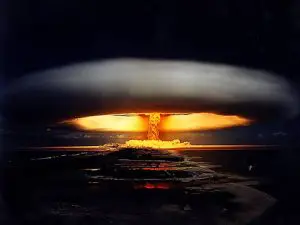Nuclear Energy
A simple definition is, Nuclear Energy is the energy released during fission or fusion of atomic nucleuses. But, looking beyond the definition, nuclear energy is the result of men’s desire to look for new possibilities. Simple facts said that during the World War II, scientists from Germany and America vied to make a powerful bomb using energy from the atomic core. In Chicago, a team of scientists, led by Professor Enrico Fermi, managed to provoke the first controlled nuclear reaction. It was the atomic bomb first birthday. They found a way to distinguish this core fissile process. In a small amount of matter was released a large amount of energy, known as the atomic bomb heat. In this case the process occurs very rapidly, as a result of a sudden and devastating explosion of energy. We will discuss about the advantages and disadvantages of nuclear energy in this post.
Advantages and Disadvantages of Nuclear Energy
Nuclear energy can be obtained in two different ways: by fission of a heavy nucleus or by fusion of two easy nucleuses. Fusion reactions are difficult to maintain because the two nucleuses repel but unlike fission reactions, fusion does not create products radioactive. The obtained nuclear energy is so powerful so it can be used in both good and bad purposes. The advantages and disadvantages of nuclear energy are described below.
Advantages of Nuclear Energy
This source of energy – nuclear energy – has been brought to knowledge of mankind through destructive force and will be a long time regarded with fear and suspicion, facing enough obstacles its development path for peaceful purposes. It is therefore essential familiarize the masses with nuclear issues as peaceful applications of nuclear energy are essential to progress and the evolution of human society. Some principle advantages of nuclear energy are listed.
- Nuclear energy is less expensive than using spent fuel: for example, a grain of uranium 238 can produce the same heat produced by the combustion of coal or 1 to 2.7 tons, 9 tons of oil. Imagine that, one tone of U-235 produces more energy than 12 millions gallons of oil;
- Nuclear energy is clean in their creation process than other natural methods of producing energy;
- Nuclear energy does not pollute: other sources of energy production occur that increase greenhouse effect;
- Nuclear energy is a viable option for the future: uranium reserves, necessary for the development of nuclear energy are more consistent than natural (coal and oil); they are expected to last at least 100 years, given that coal reserves are already in a rapid decrease, and the oil is enough for more than 47 years.
Disadvantages of Nuclear Energy
Construction of nuclear reactors and the possibility of using these nuclear power plants to produce electricity in large quantities generated a simple question: what would happen to people, both those who work in these factories and in the surrounding area?
Steady growth in the number of nuclear reactors and nuclear power plants will require the application of security measures to avoid possible accidents and their consequences. The disadvantages of nuclear energy are as follows.
- High production costs: Nuclear power plants are very expensive, so in the construction process and in terms of maintenance costs; a nuclear plant cost between 3.2 to 12 billion dollars.
- The danger may be if accidents occur in the nuclear power plants: remember what happen in 1986 at Chernobyl and these days in Fukushima.

- Nuclear power plants must be located near a continuous source of water: the fact that the uranium must be cooled continuously is one of the reasons why water source must be present near the plant having a very high rate and without the shutdown threat.
- Produce radioactive waste that must be stored for hundreds of years before becoming harmless: necessary that they be placed in special places in well sealed silos that do not let the outside producing leaks, which would lead to a high degree of radioactivity and consequently to human victims and the calamity zone.
In conclusion, nuclear energy has both good and bad points. It’s depending only on how we, humans, understand to learn from the past mistakes and to think of a better efficiency of this form of energy.

Don’t get me wrong, I think nuclear energy is great. Probably one of the better sources of energy production out there but if we keep having these meltdowns the Earth will literally be uninhabitable. And that scares me. I hope we devise I more risk-free alternative soon.